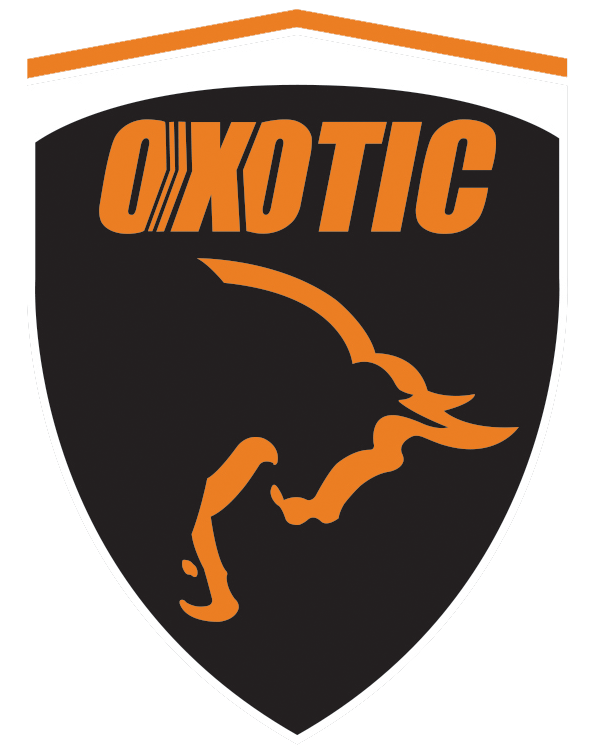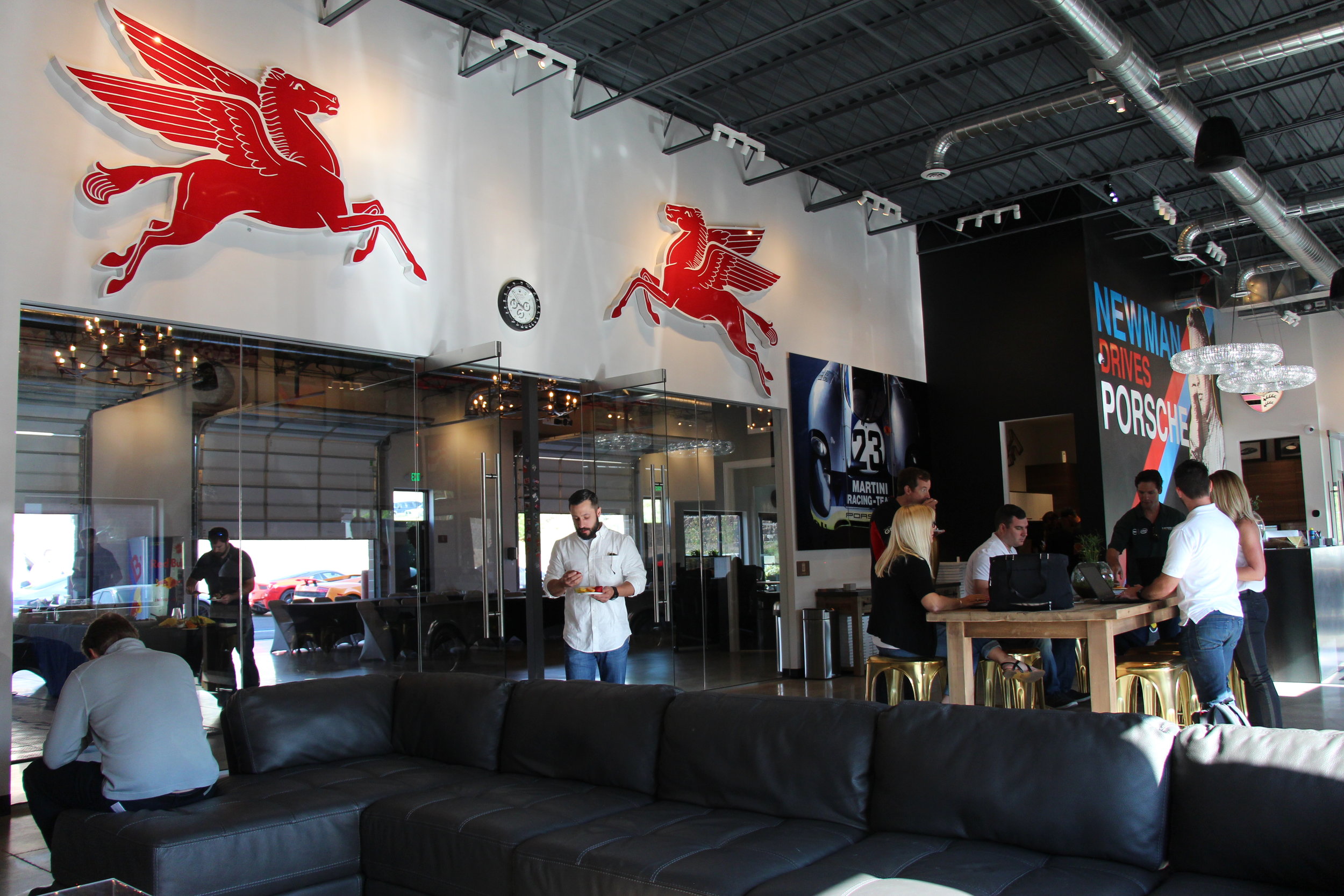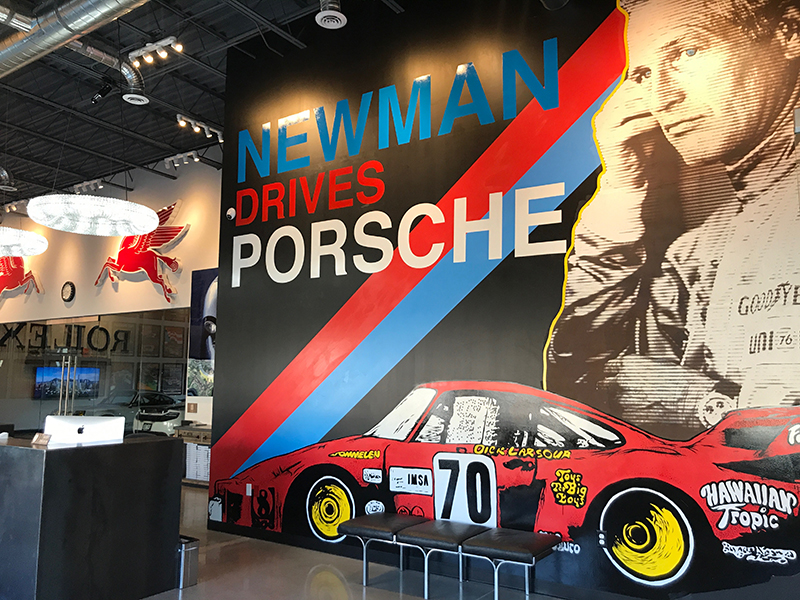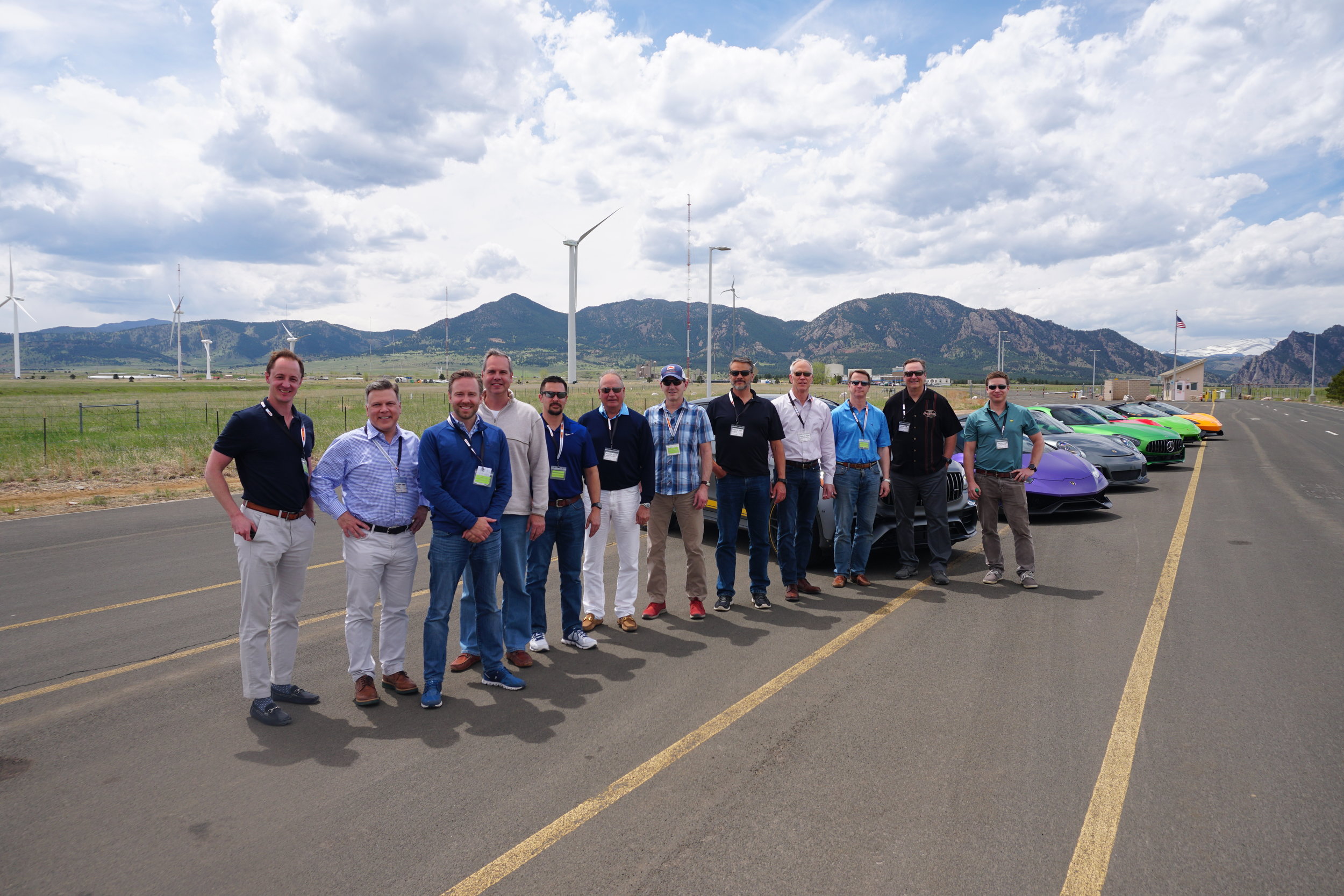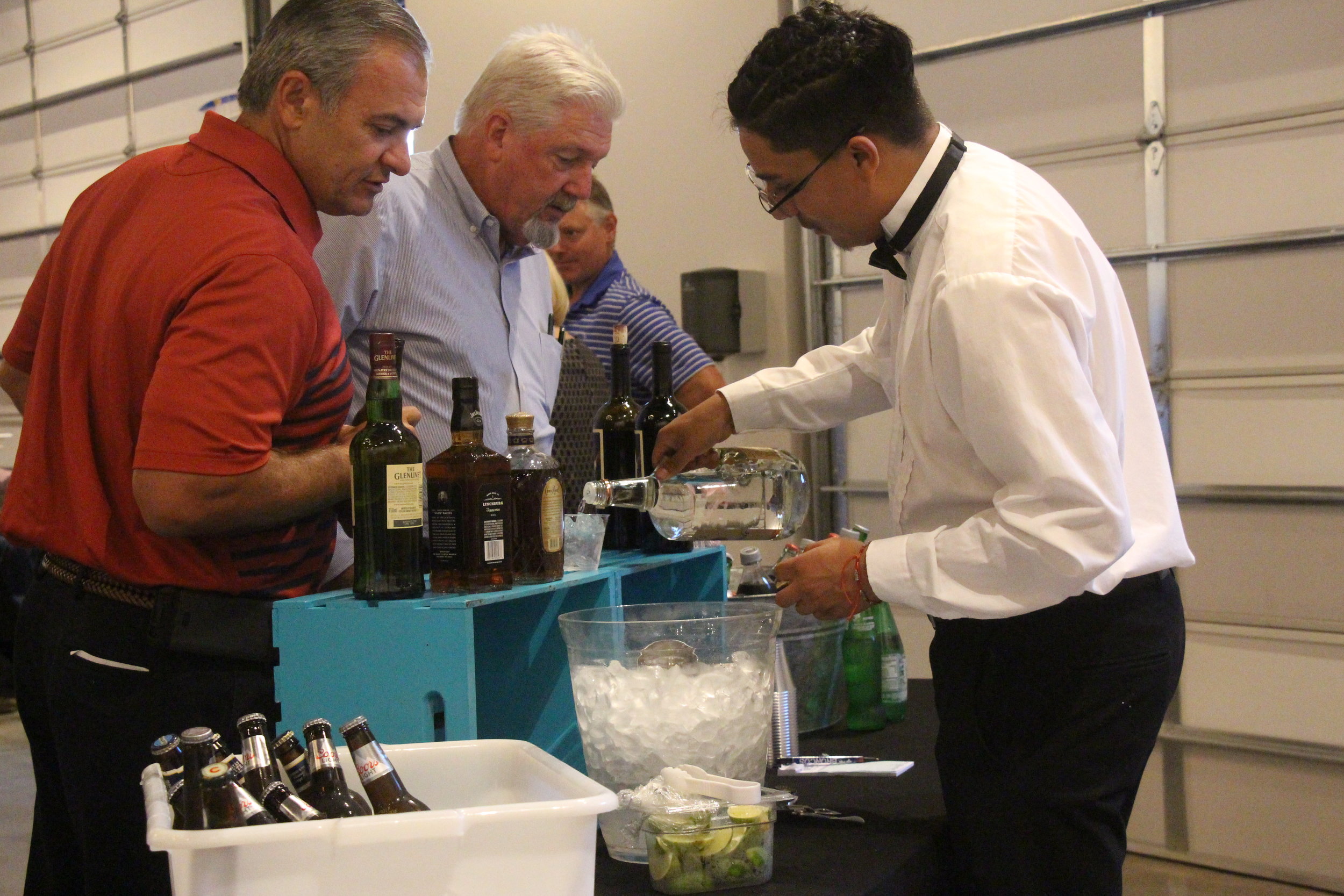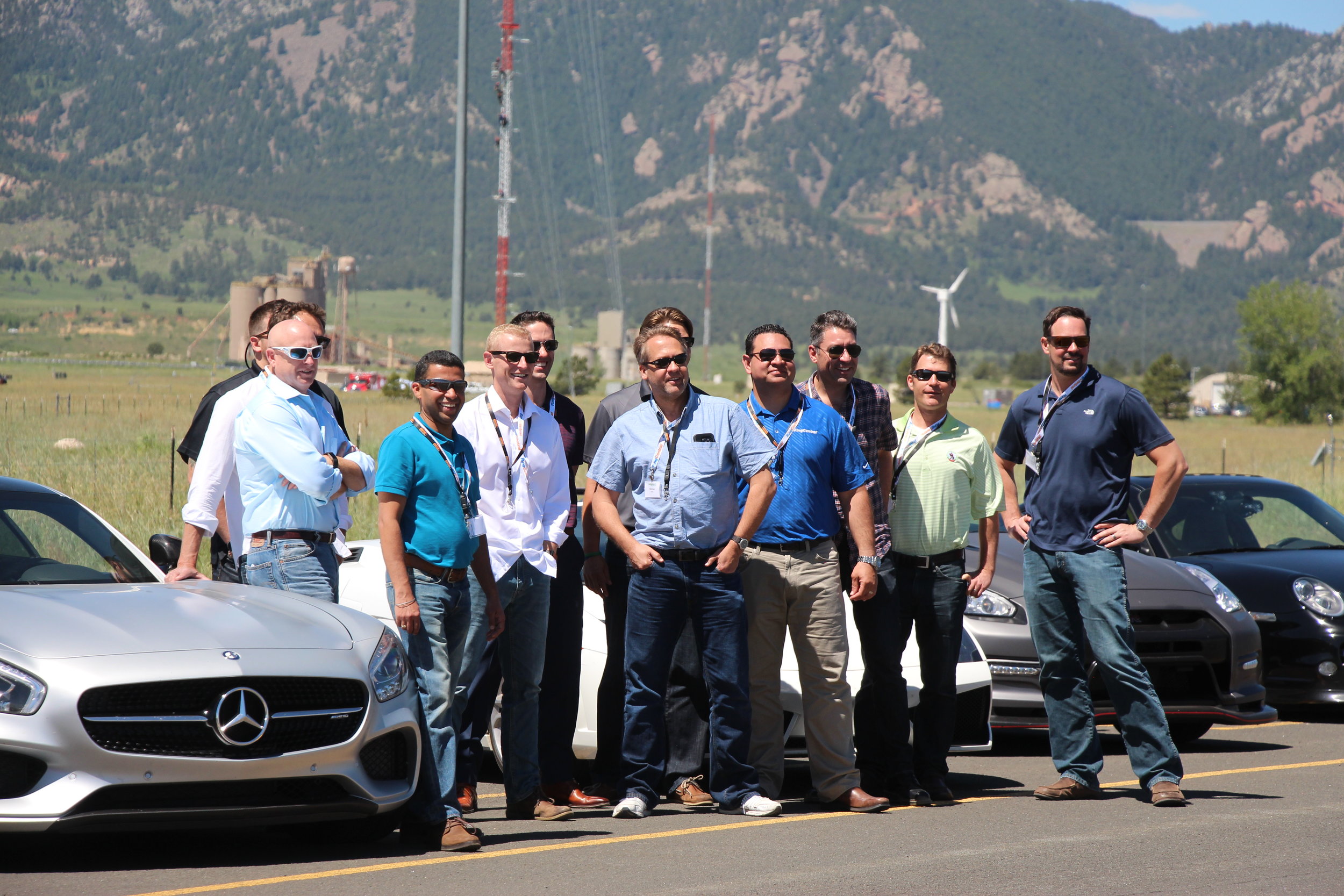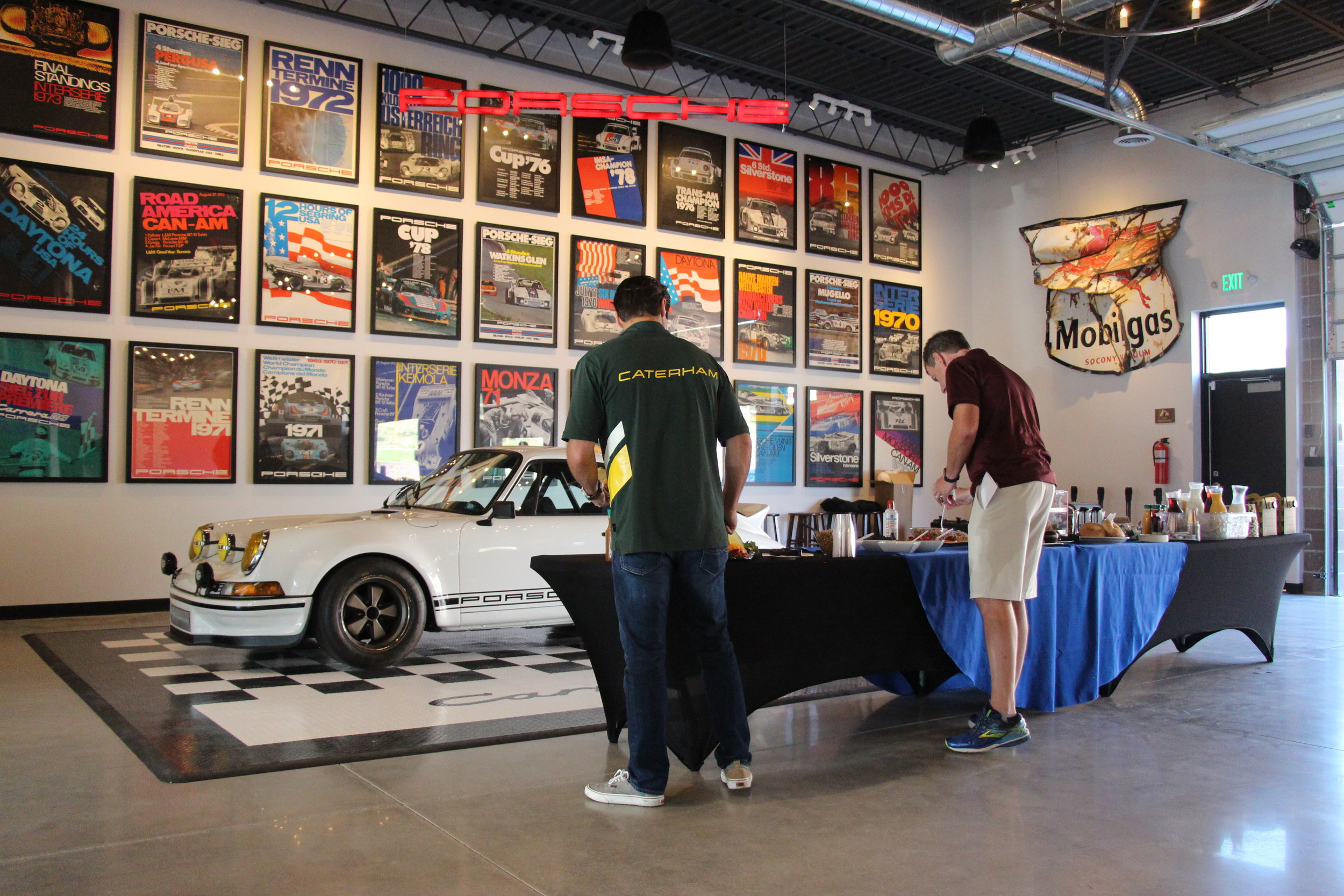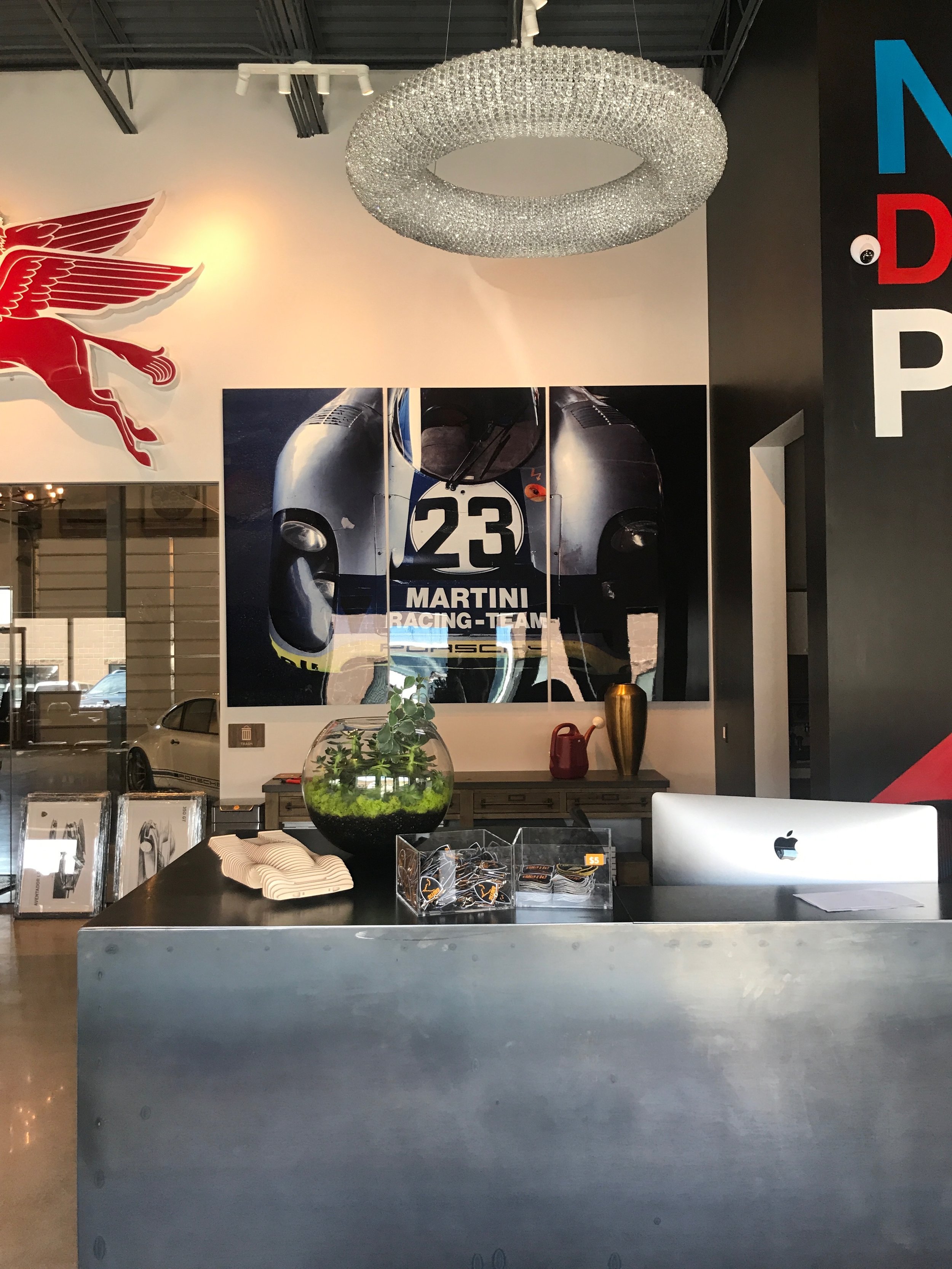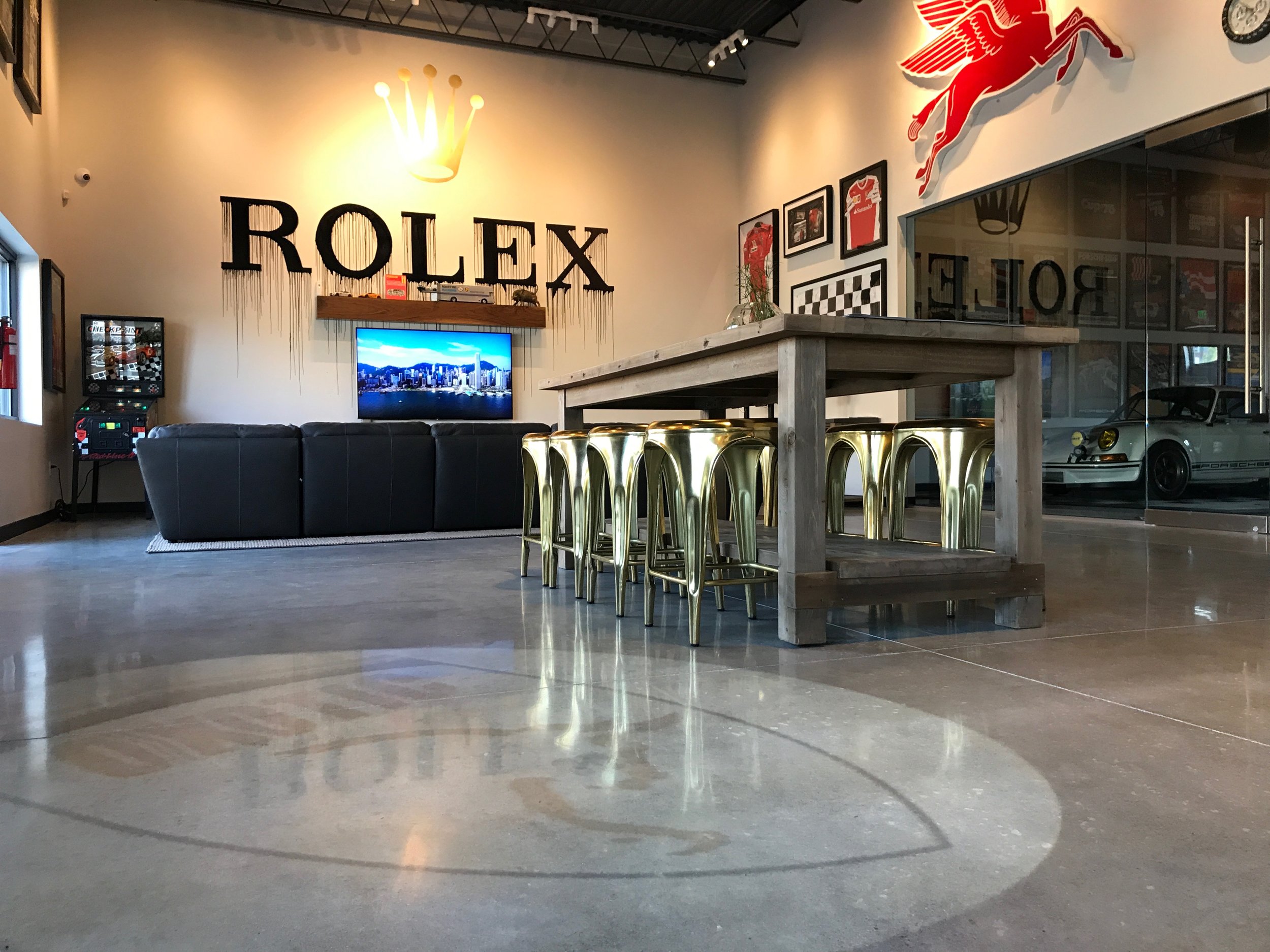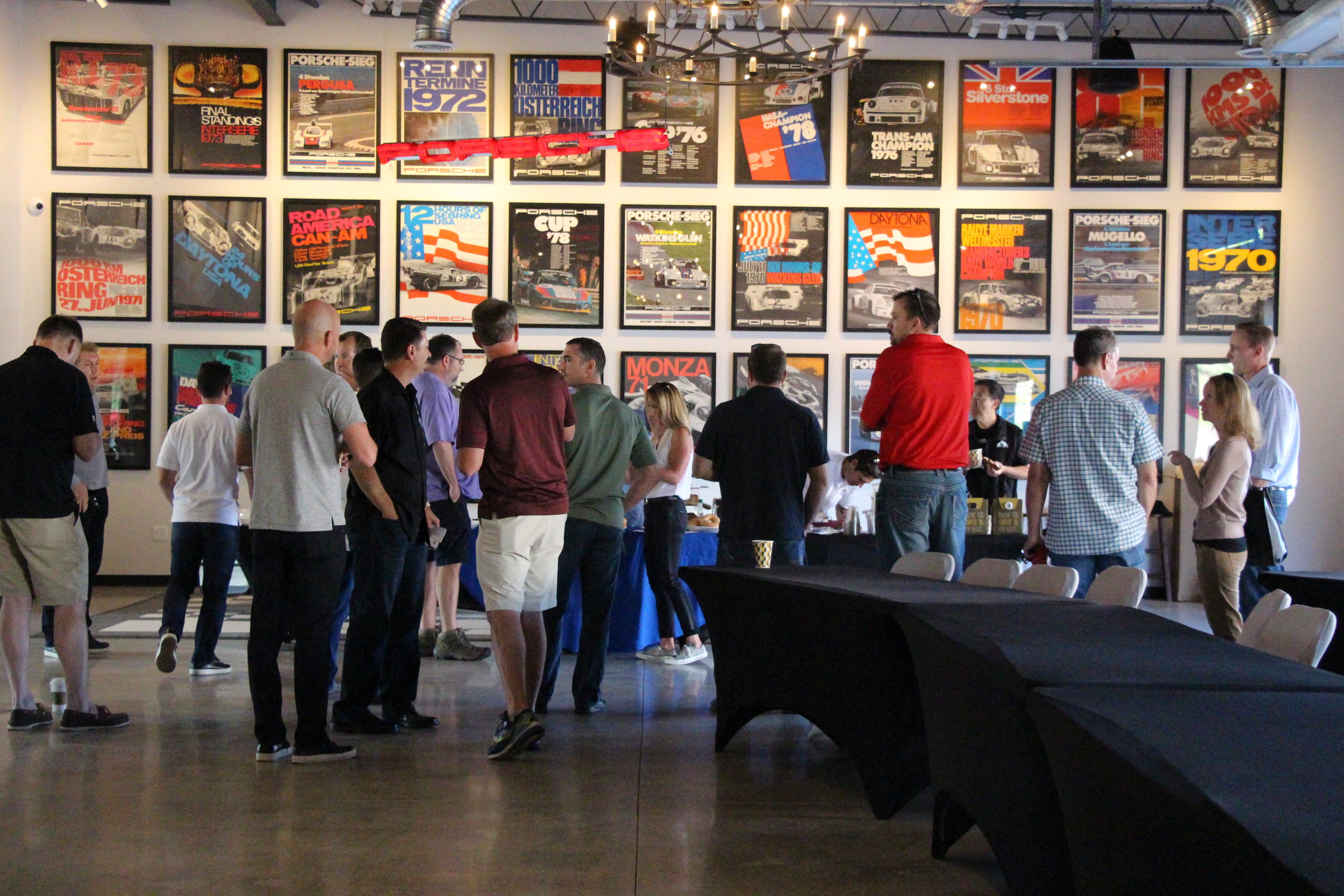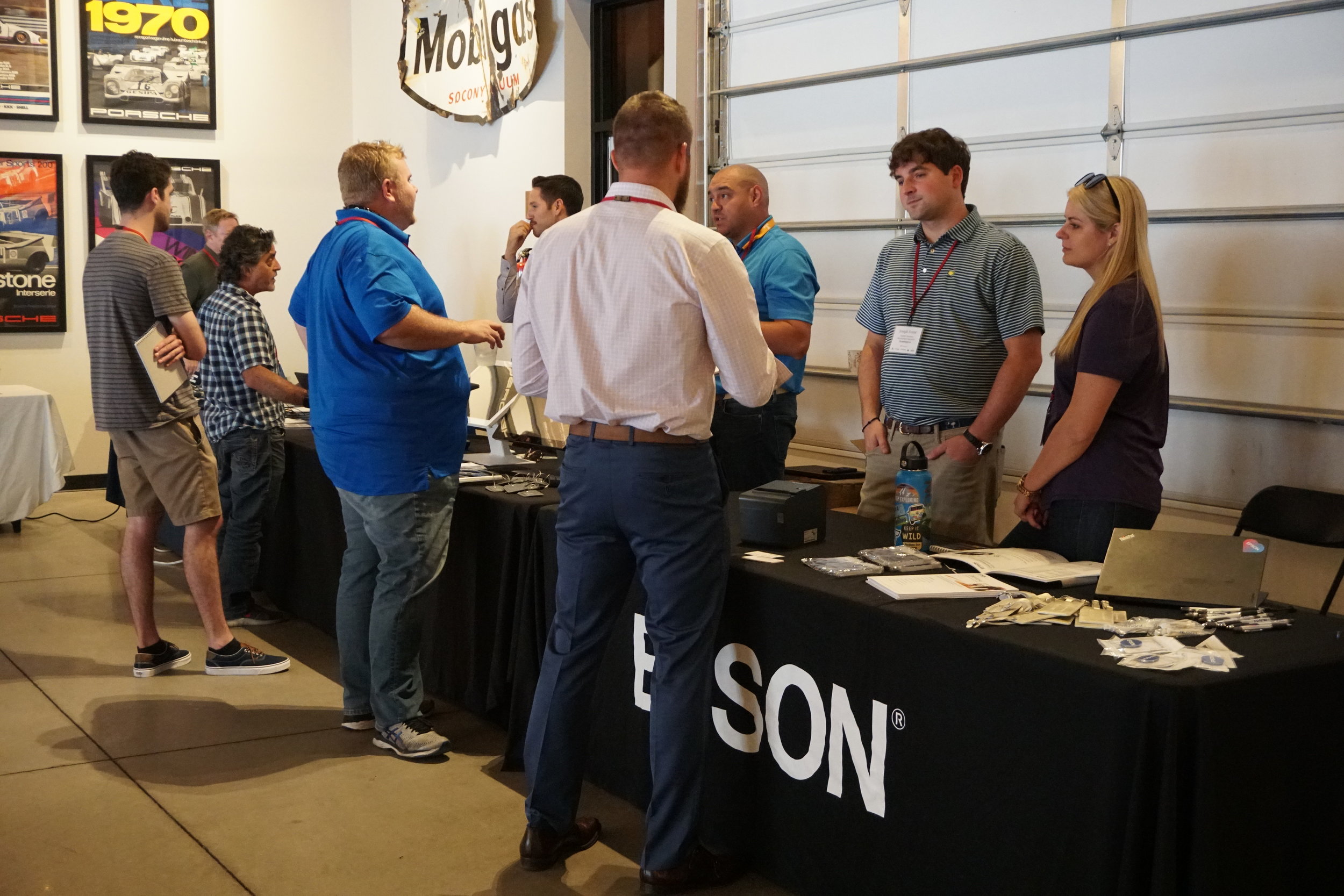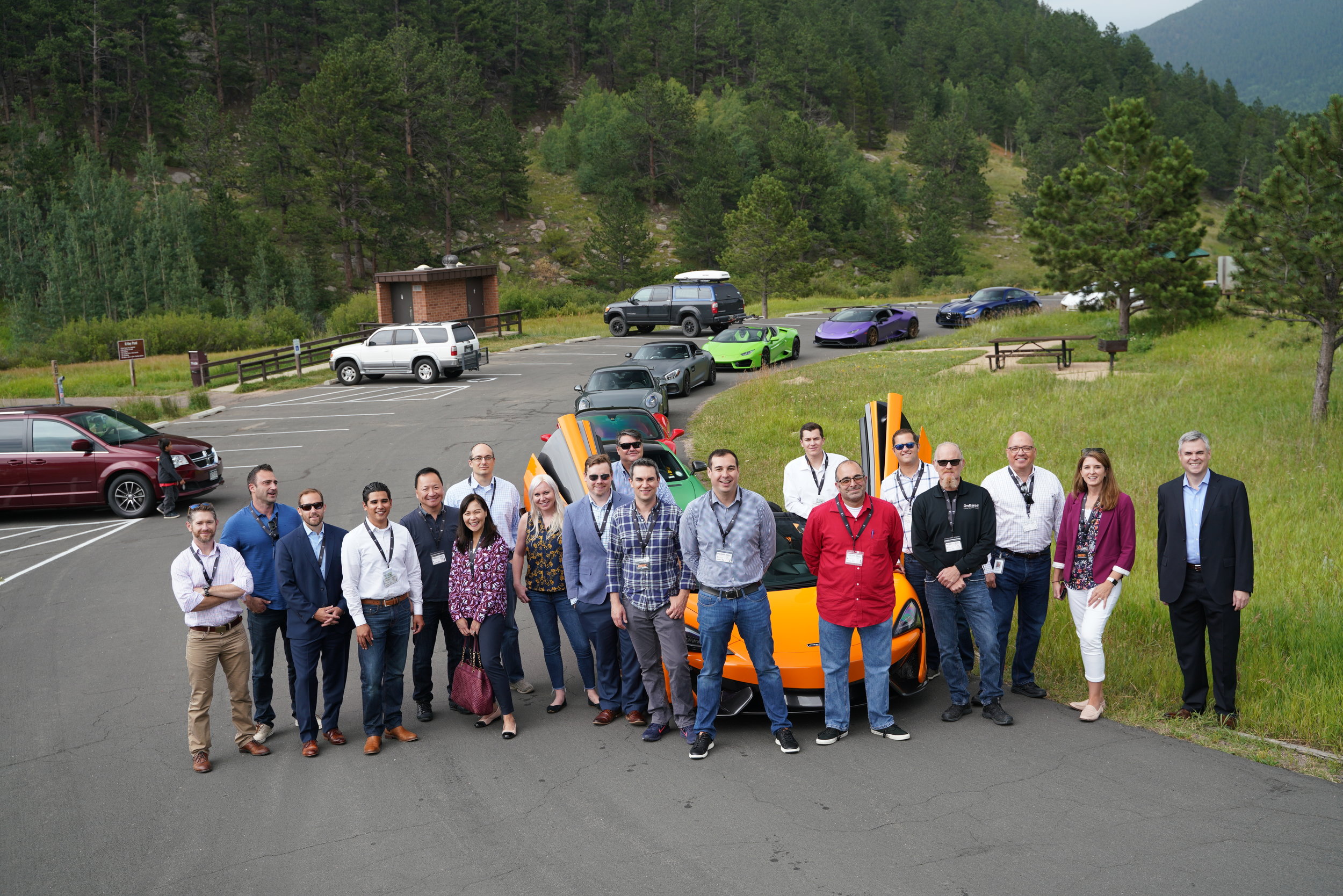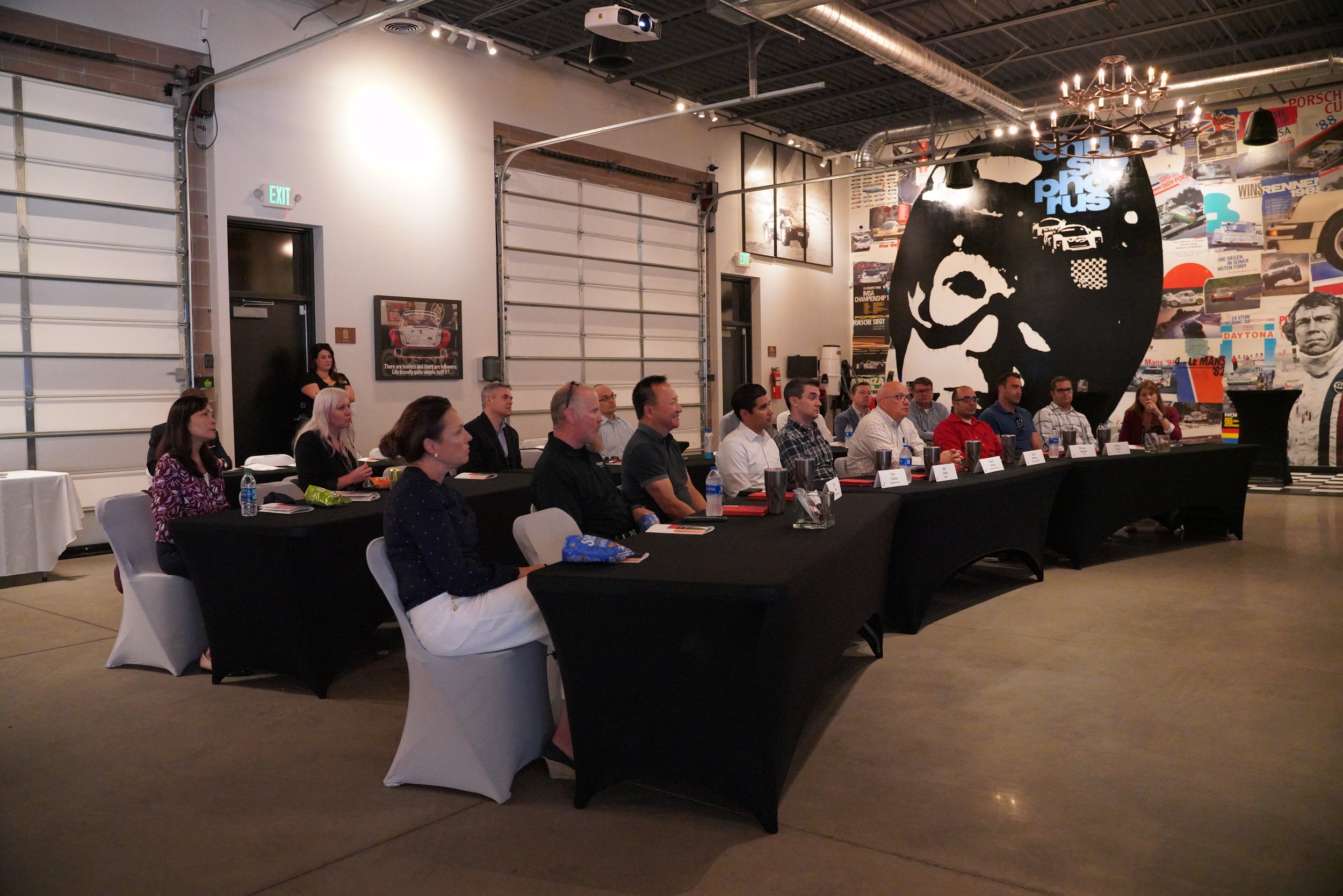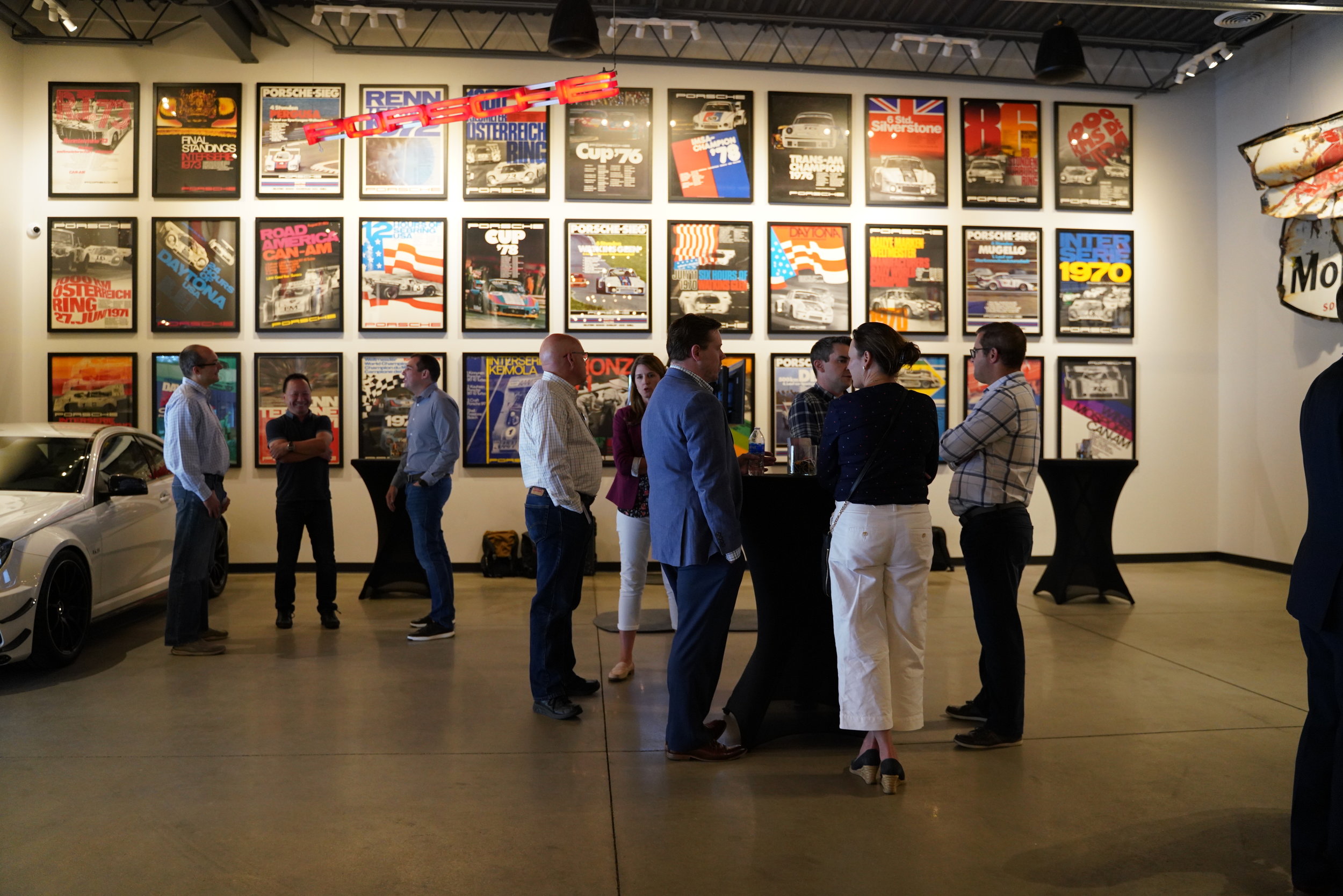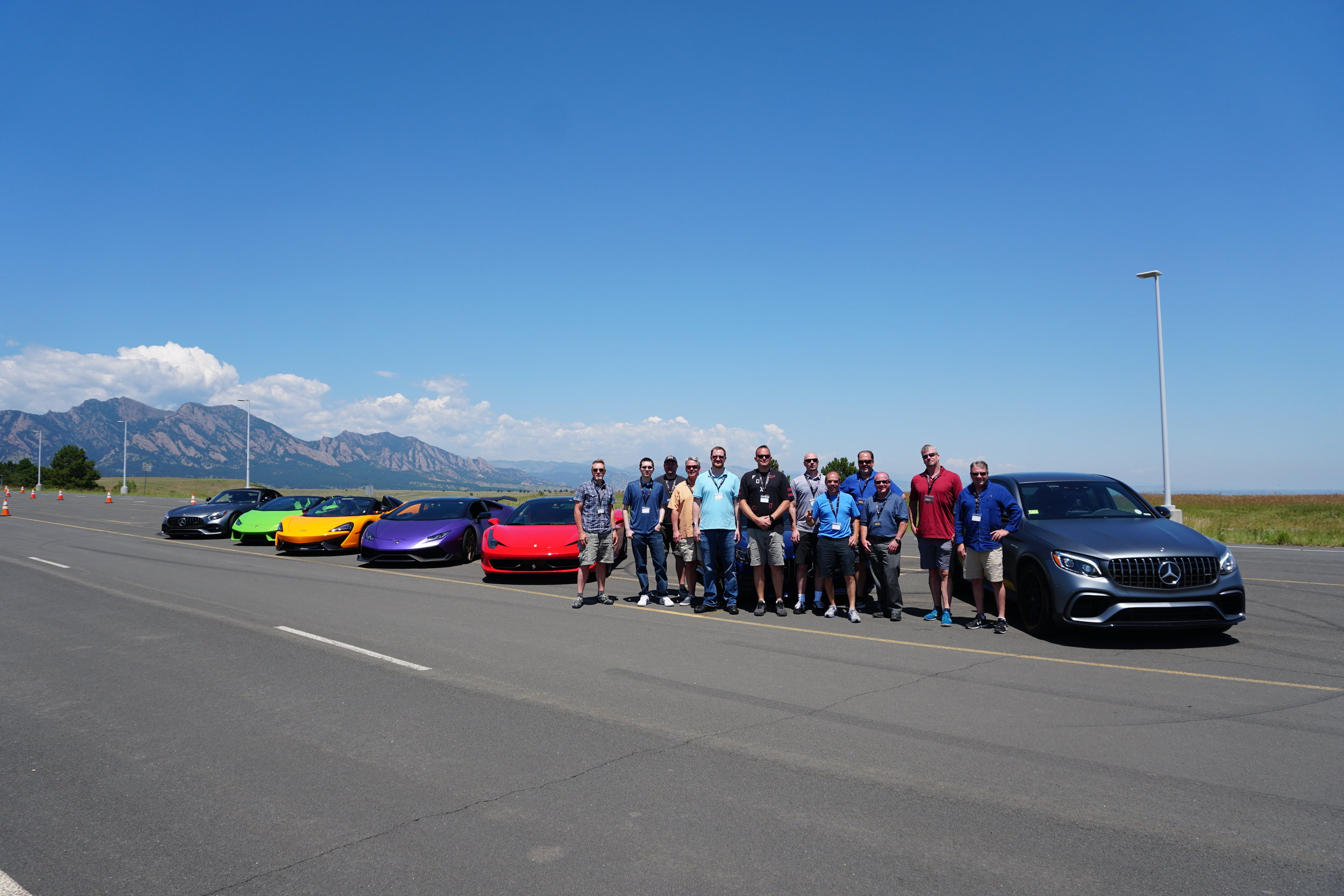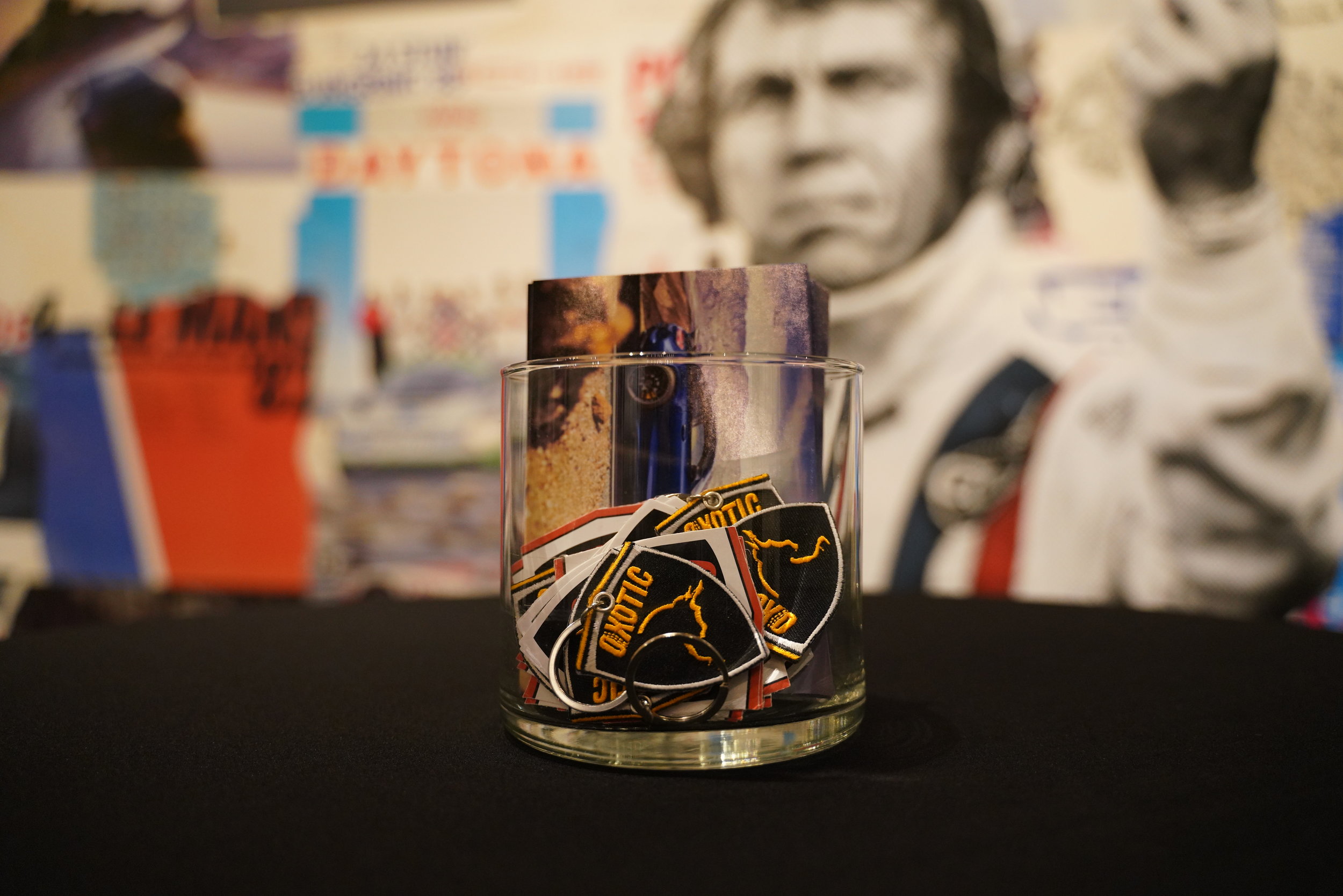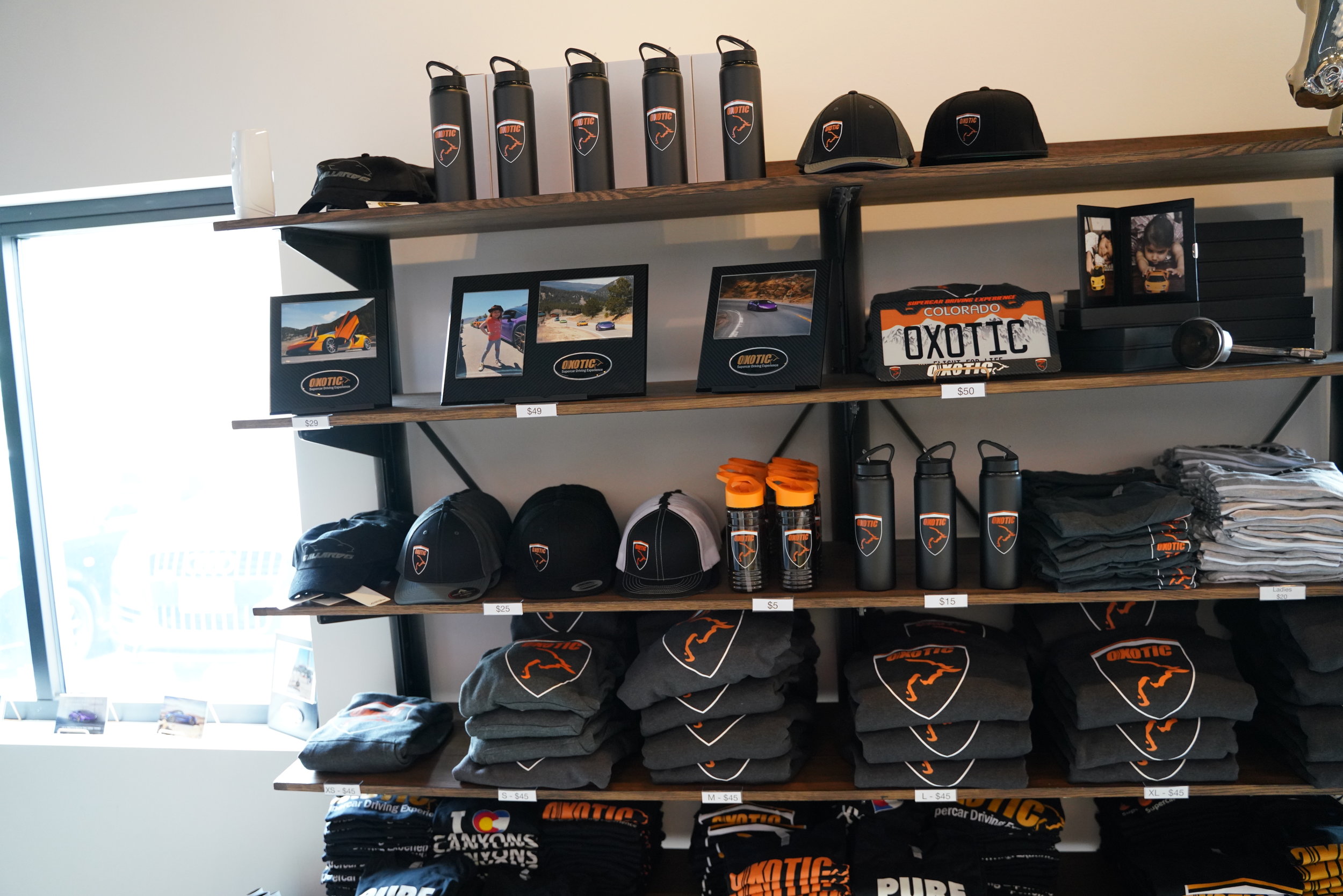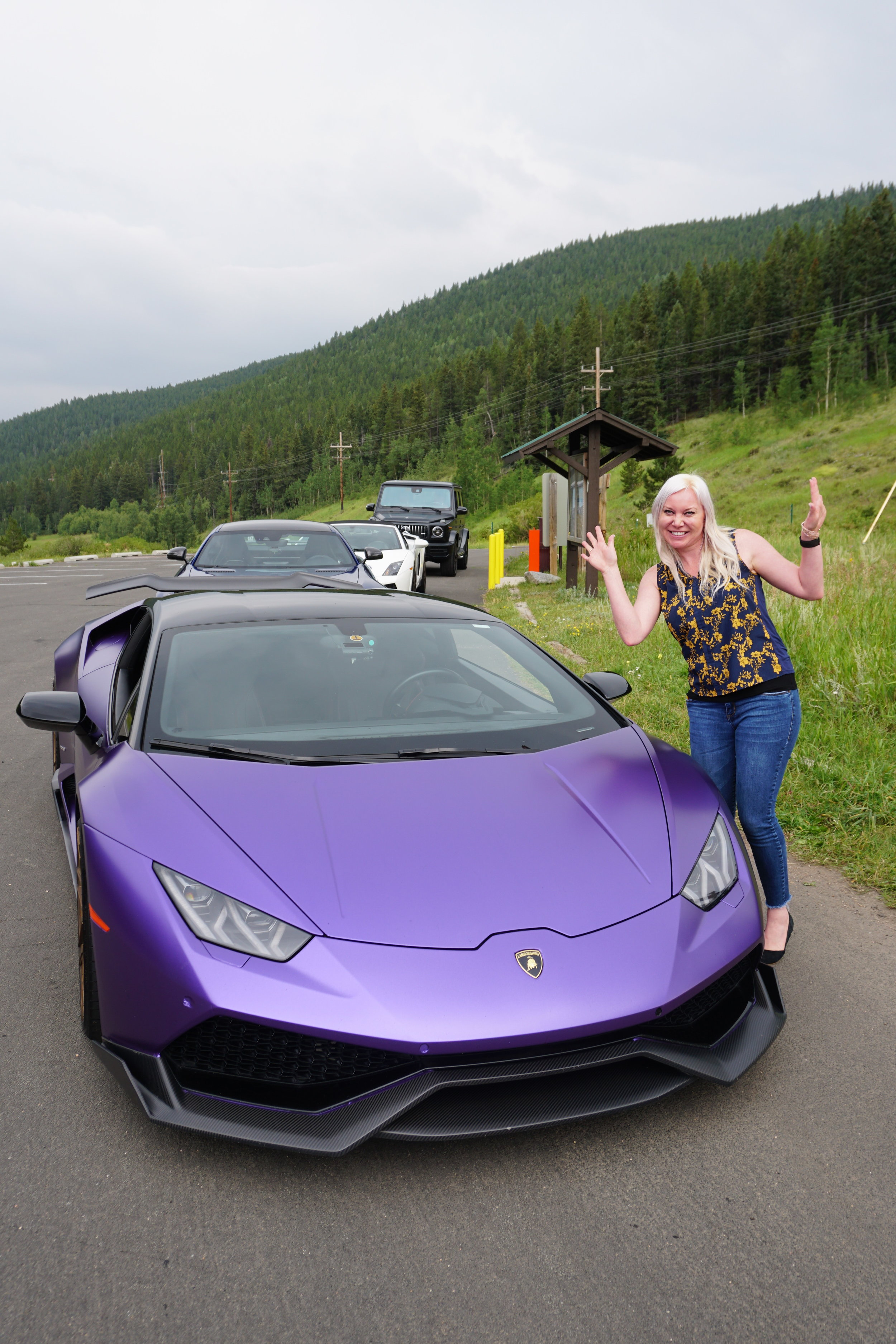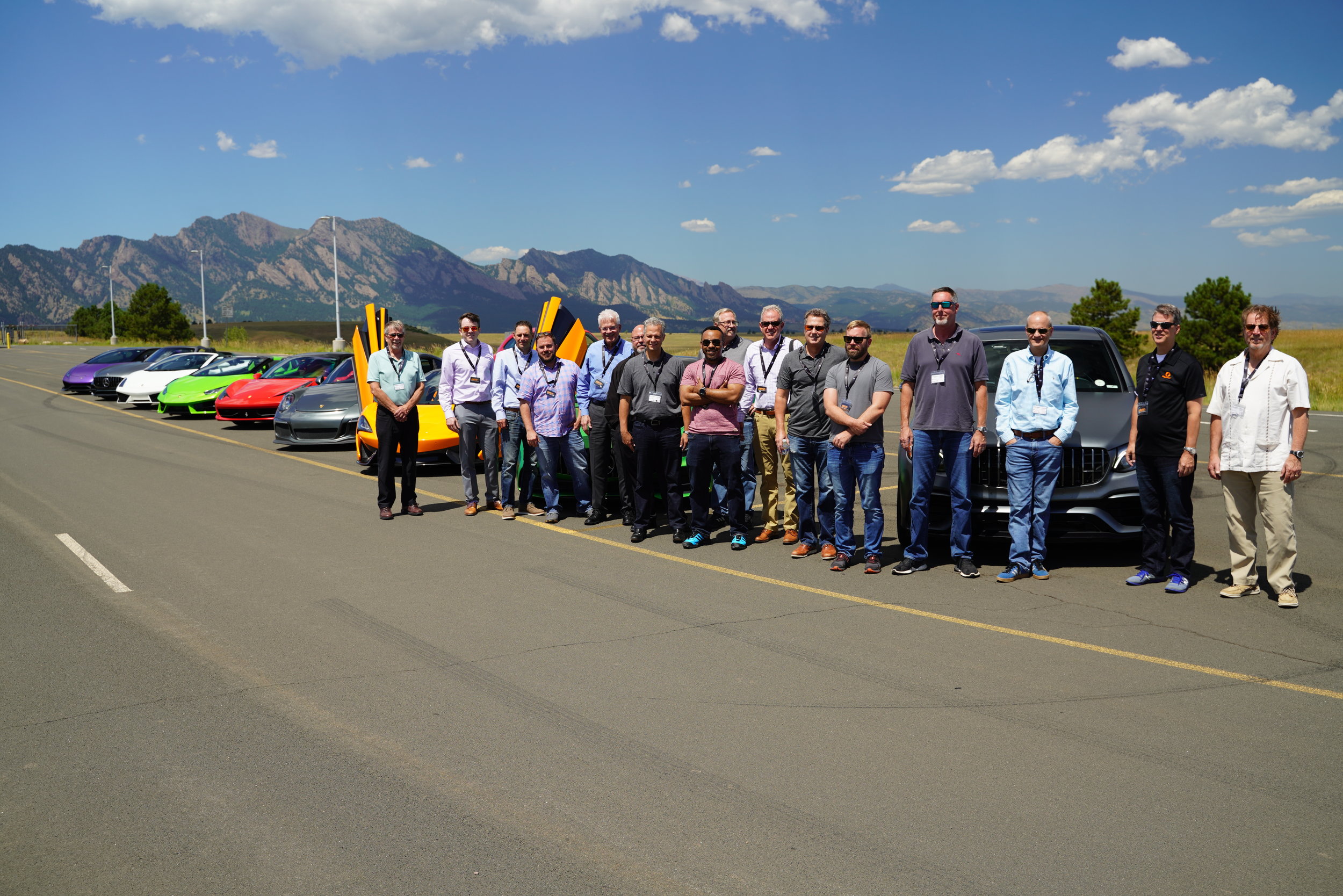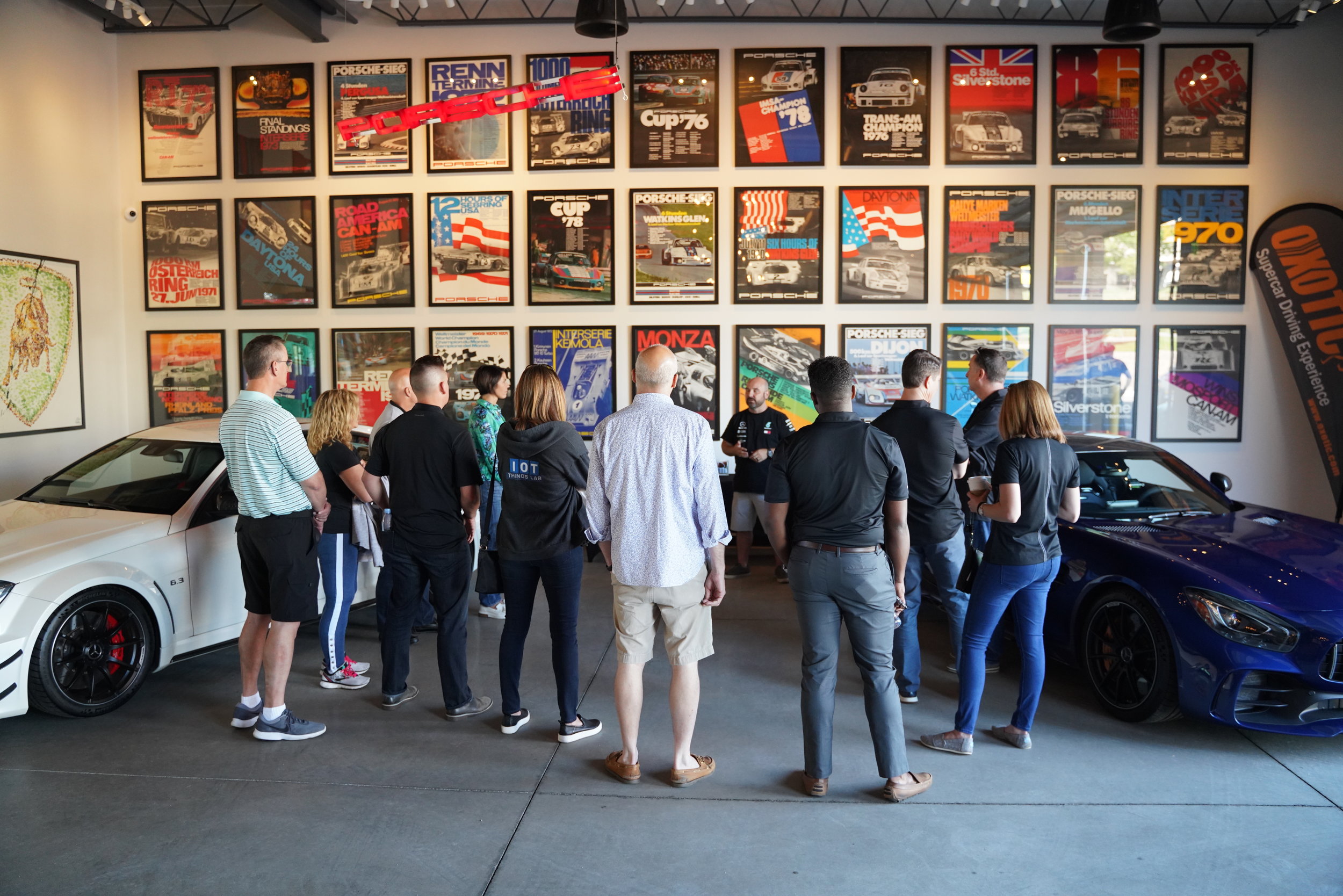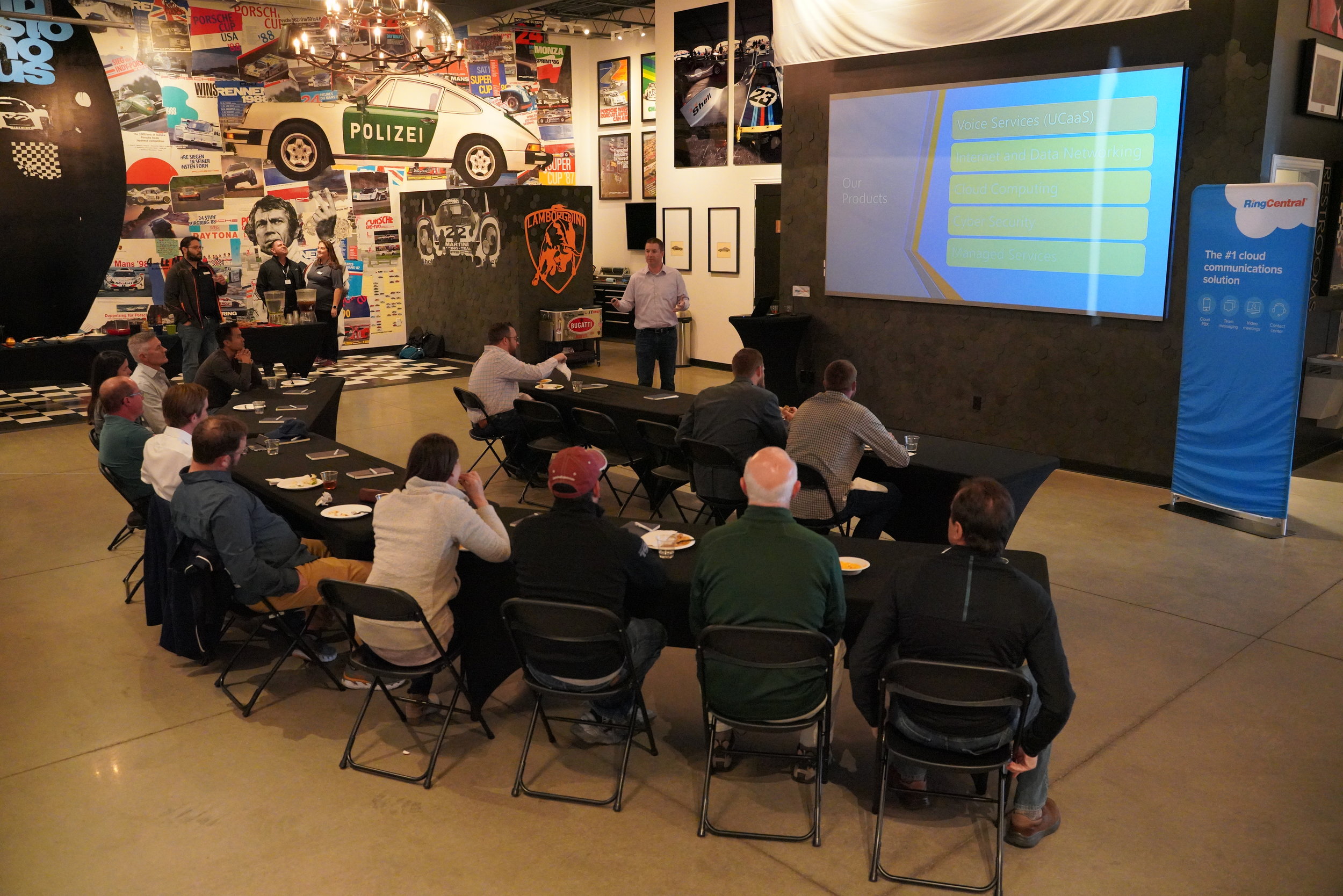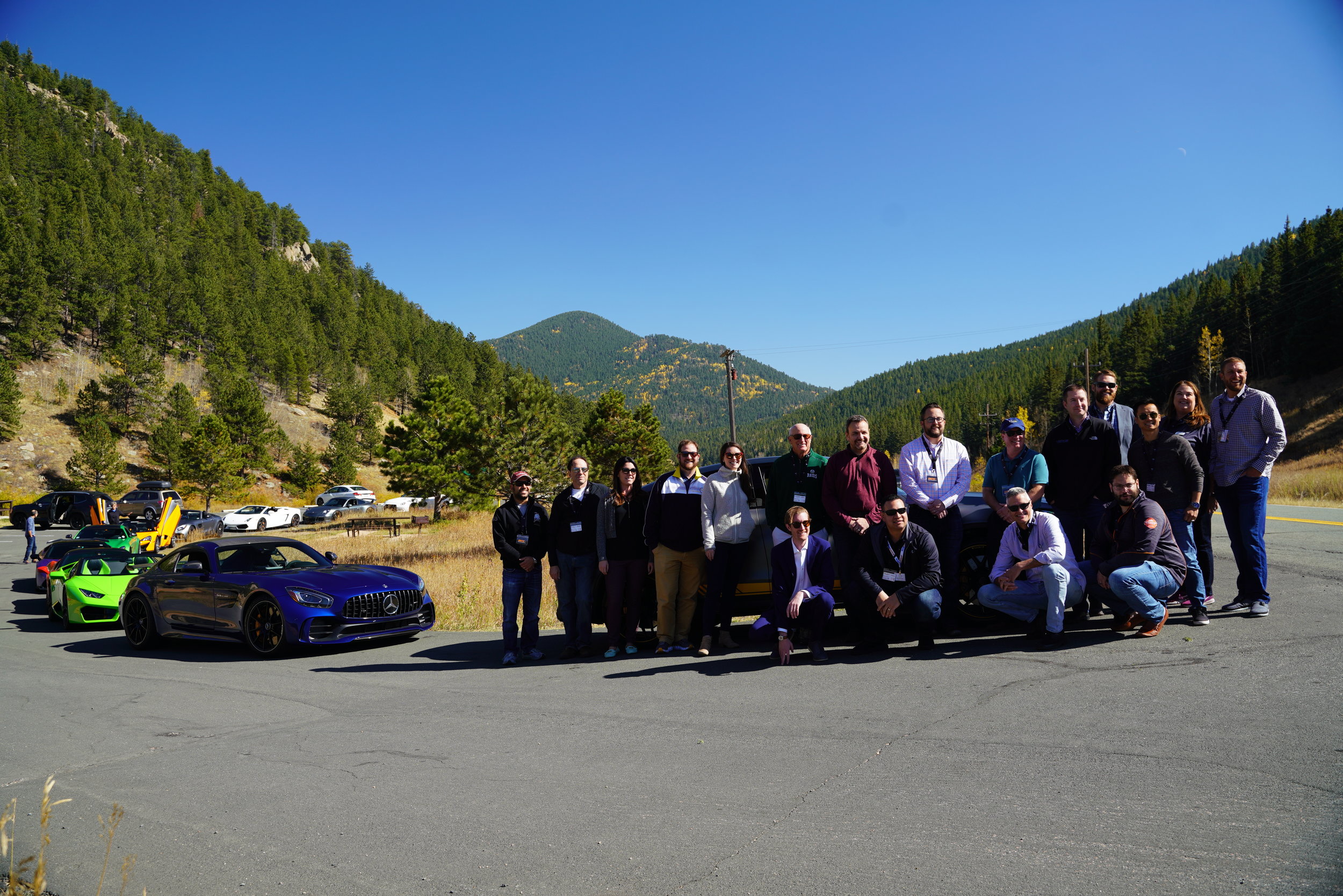Group and Corporate Events
After 11 years and over 1,000 Corporate & Group events under our belt. We can promise an amazing experience for your guests. Located at the base of the Rocky Mountains and just 25 minutes West of Downtown Denver, Oxotic's Pure Adrenaline Event Center is the perfect upscale location for a unique event.
Pair an exhilarating supercar driving tour with a catered lunch & meeting or dinner and a cocktail party. Our corporate events are guaranteed to wow your guests and clients!
Starting at $249 Per Participant
Check out Nextiva’s corporate event at Oxotic!
The Pure Adrenaline Event Center
Driving value for our clients, and creating memorable events since 2013!
Our Meeting Facility
At Oxotic we provide all inclusive events that will exceed your expectations. Our facility comes fully equipped with all of the essentials: tables, chairs, linens, and use of our state of the art A/V systems; our movie theater quality 14 foot projection screen is perfect for every presentation. Our clients love pairing a driving experience with their meeting. We offer facility-only rental for parties, corporate presentations, and events.
Dedicated Event Director & Professional Event Staff
You will be working personally with our Event Director. Who will ensure your event is a success. After all, we want you to come back year after year. Many of our corporate clients host annual events with us. We will work directly for you to provide venue setup, coordinate catering, bar services and agenda planning.
Merchandise Packages and Co-Branding
We can pair a variety of Oxotic branded merchandise for your participants to take home such as; T-Shirts, Photo Plaques, Hats, etc. We recommend putting together a merchandise basket for your participants. With advanced planning we can arrange to have co-branded merchandise.
Driving Event Options
Our events are fully customized to your needs, whether it is a half day tour with C-Suite & VIP Guests or it is a day of meetings and shorter tours for that added incentive. You will work with our Event Director to develop a day that will work within your company's budge, required meeting structure and overall outcome of the day.
Photography
Our staff photographers will be available to capture the moments throughout your event. We will include a photo bundle where all of your participants will have access to all of the high resolution photos taken throughout the event at no charge to the participant.
Types of Corporate Events
Catered Lunch & Learn Events
Product Showcase & Trade Shows
Software & Product Launches
Team Building & Employee Appreciation
Sales Incentive Trips
Board Meetings
Sales Kick Off Meetings
Client Happy Hour Events
Networking Events
Holiday Parties & Award Ceremonies
These are just a few of the impressive clients we have hosted at our event center in Golden, Colorado. We are now in our 10th year of business, we have entertained over 35,000 participants. Our team executes hundreds of successful and highly attended events throughout the year. We are always looking for new clients that want to experience an event like no other. I would love to chat with you if you want to learn more about our events! You can reach me at 855.484.1550
CASE STUDIES
PricewaterhouseCoopers
Software Launch, SME Lunch and Learn Meet & Greet, followed by a 30 Mile Supercar Rally Tours & Happy Hour
Hewlett Packard Enterprise
Sale Team Incentive Trip, 105 Mile Rally Tour, Picnic in the Mountains & Mercedes AMG GTR Give Away
PCM - Insight
Lunch & Learn, Product Showcase, Back to Back 65 Mile Supercar Rally Tours & Happy Hour
ScanSource
Indirect Sales Channel: Lunch & Learn, Vendor Sponsored Trade Show & 30 Mile Supercar Rally Tour
Highlights
Events from 10 to 100+ Attendees
Hosting over 3,000 participants annually
All inclusive arrive & drive events with our dedicated Event Director
Affordable and quality event with a High ROI per participant
Priceless 1:1 seat time with clients
Our client’s experience < 90% RSVP Rate amongst “C-Suite” Guests, with Attendance rates above 95%
Bucket List worthy experience that gets your clients out of their office and in front of your product.
Reengagement tools and opportunities
The Ultimate Guide to Corporate Event Planning
As Peter Drucker once said, “Plans are only good intentions unless they immediately degenerate into hard work.” When organizing a successful party or a business meeting for one of the most demanding category of event-goers, corporate staff, you need a well-laid-out plan.
How do you know what bells and whistles will wow your audience? How do you manage your event team? And how do you ensure nothing gets lost in the shuffle? Below, we’ve made a bold attempt to answer all of these questions and more in one comprehensive corporate event planning guide.
Here’s what you’ll know after reading this post:
What is a corporate event, and what are the main reasons for organizing one?
What makes a corporate event different from other types of events?
What are the key types of corporate events?
How to organize a corporate event step-by-step?
What is a corporate event, and what are the main reasons for organizing it?
Whether it’s a celebration of your marketing team’s achievements, a new product launch, or taking one hundred team members on an incentive trip to Buenos Aires, all of these wonderful events can be considered corporate events. When sponsored by a company, a corporate event can be either focused on internal staff (appreciation parties, team building events, etc.) or clients (trade shows, charity events, etc.).
Considering that there is such a huge variety of corporate event formats, it’s easy to predict that each of them has different goals. Here are the main reasons why corporations put so much effort into planning and executing corporate events, along with the types of events they usually correspond with:
Raise brand/product awareness (trade shows, conferences, product launches)
Improve company culture, help employees bond, and entertain staff members (incentive trips, holiday parties, team-building events)
Recognize team/individual achievements (appreciation events, product launches, and incentive trips)
Discuss company improvements or project outcomes or motivate your team (business dinners or board meetings)
What makes a corporate event different from other types of events?
Planning an event for a corporate team is different from planning a stand-alone exhibition. From a tight budget to a failure to match the company’s mission, corporate event planners are always prepared to meet any of the numerous challenges in their path.
So how do you know if you’ve bitten off more than you can chew? To help you determine this, we’ve created a short quiz that perfectly reflects the unique nature of corporate event planning. Check out the questions below, and provide a yes or no answer to each of them:
Can you guess what kind of movies a person likes to watch after having a one-hour conversation with him or her?
Would you discuss an event with all company stakeholders before beginning the planning?
Could you manage event attendance with no tickets or invitations?
Do you think it’s important to build a memorable marketing campaign to promote a corporate event?
Would you develop a timeline for each stage of planning, execution, and follow-up?
Would you create surveys for employees before planning a corporate event?
Would you analyze the ideas that employees have about an upcoming event and then try to align them with what you are planning?
Do you think you could organize an event in Spain even if you don’t speak Spanish and you’ve never been in this country before?
Have you ever successfully negotiated a price with an event vendor before?
Would you document an event budget while considering both the expected and actual costs?
If you answered “yes” to eight or more questions, put your doubts aside and schedule a meeting with a client.
Whether you’re a self-employed event planning hero or a member of a team, you should know these three laws of corporate event management. First, no matter the number of invitees, you should always find a good way to manage attendance even if there are no tickets involved. Second, if you work as a hired hand, you have to be ready to sacrifice some of your private time to dive into the corporate culture. Spend some time in the office, talk to people, ask event invitees and stakeholders about their expectations, etc. If you don’t know what a company stands for, you won’t be able to organize a successful corporate event for its staff. Lastly, you have to be a survivor. Corporate events are often organized in foreign cities and countries, which requires you to be super flexible in terms of accommodations and venue booking, finding vendors, exploring the most convenient means of transportation, etc.
What are the key types of corporate events?
Quite often when people hear the term “corporate event” they imagine an office party with good music, delicious food, and networking. As an event planning professional, you should understand that corporate meetings can mean much more than that. Below, you can find the top eight trending corporate events that your client may ask you to organize, along with their goals and average estimated budgets:
The advanced guide to corporate event organization
While catering to three main stages of event planning, we’ve put together a list of key steps in planning any corporate event:
Before the event
Tap into stakeholders’ goals
Because it’s the company’s mission that matters the most, don’t start planning a corporate event by focusing on your own goals. Instead, invest your efforts into clarifying the message your client wants to communicate. Organize a group meeting with stakeholders, or discuss corporate event planning ideas during one-on-one discussions with the most influential person no later than 12 months before an event. The important thing to consider is that the people you’ll be having a meeting with won’t want to sacrifice hours to talk about everything and nothing. To make a dialogue truly meaningful, prepare a list in advance of questions you’d like to ask.
Based on the information you collect, build your event concept by reflecting the main purpose of an event. Come up with good reasons why people should attend it and the metrics for measuring the event’s success. Let’s say you organize an appreciation event that aims to reward a sales team for landing their first big customer. After discussing the concept with stakeholders, you can brainstorm the following goals and metrics which will constitute your event case:
Goals:
Ensure the best exposure for the sales team’s work
Demonstrate that you value the work of your staff
Reward a sales team with a valuable prize
Turn an appreciation event into a relaxing experience for the entire corporate team through entertainment
Set new goals and targets.
Metrics:
Personalized post-event surveys for a sales team or the whole staff
Statistics based on attendance or involvement
Organize your checklist and timeline
Ideally, you should establish a deadline for each task that you have to accomplish before, during, and after an event and then put them into one comprehensive checklist. If you manage an event team, you also need to create a list of tasks for each team member. Utilize an effective system for task assignment and progress tracking to keep every step of the event planning process under your control.
Related: The ultimate corporate event planning checklist
Develop a strategic budget
Whether your initial budget is super generous or very tight, an event’s overall success does not depend on the amount of money you spend on it. Make a list of tasks that require some budget spending, find the best offers, and calculate whether the total sum matches your expectations. Ensure you have some back-up funds in case unexpected expenses arise. To cut down on costs, consider price negotiations, ask event sponsors for some support, and recruit volunteers.
At the event
You should start promoting long before an event, and this may not end until weeks or even months after the event in order to achieve the best results. In relation to marketing, it’s a useful strategy to organize two checklists: one for the promotion channels you will utilize and a second for strategies. Another option would be to create a timeline where you will identify the campaigns you’ve already executed or plan to execute. Here’s a good example developed by the University of Alabama:
During an event, top-notch marketing can help you keep excitement high through the use of social walls, pre-scheduled email campaigns, and mobile app notifications.
Manage onsite processes in real time
Finding an event tech vendor that can ensure a seamless onsite check-in experience is an important pre-event task. However, with the right tools at your fingertips, you should be able to keep onsite registration under control during an event.
After the event
Follow-up
Efficient follow-up activities help close all the deals for trade fair participants and are a way to say thank you to the employees attending a team-building event. Through the use of social media advertising, email marketing, and surveys, you can close the event in the best possible way. Here is a list of tips on planning a corporate event follow-up:
Utilize pre-made content. Just in case you’re super busy and desperate for sleep after an event, follow up with attendees using pre-made content.
Schedule emails. Not only should you say thank you, but sending post-event emails is also a great way to advertise a special offer, sell tickets for the next event, or increase sign-ups. Discuss the follow-up goals with your client in advance so you know which goals you should focus on.
Continue building social media connections. This is particularly useful for product launch and trade fair organizers. A social media community built after an event can take a company’s recognition sky high.
Conclusion
There’s no clear recipe for how to plan a great corporate event but the Oxotic Events Team will do the heavy lifting for you!
